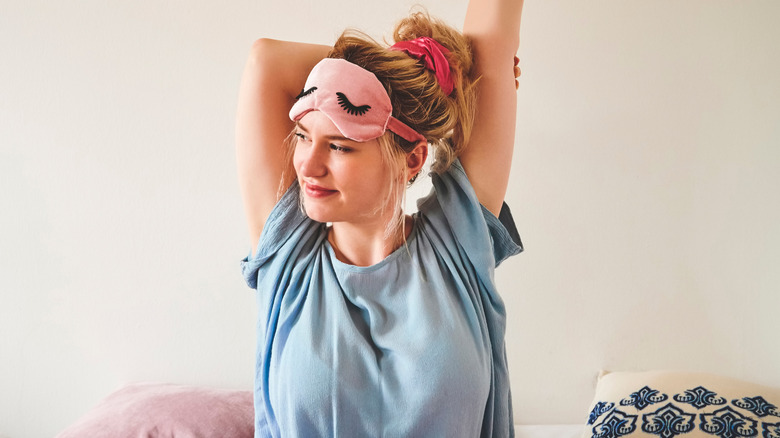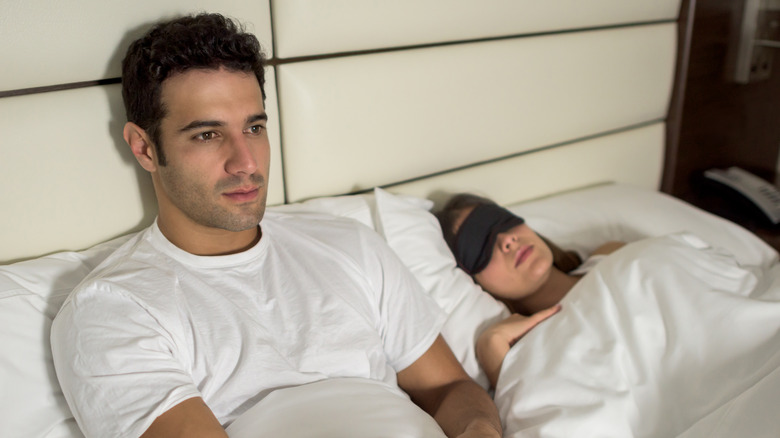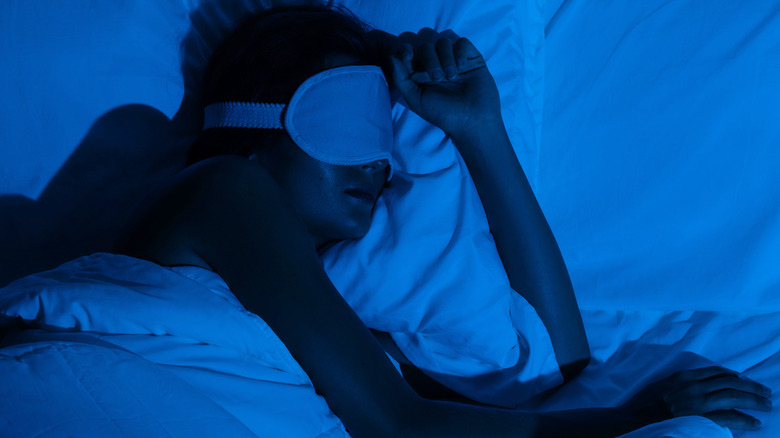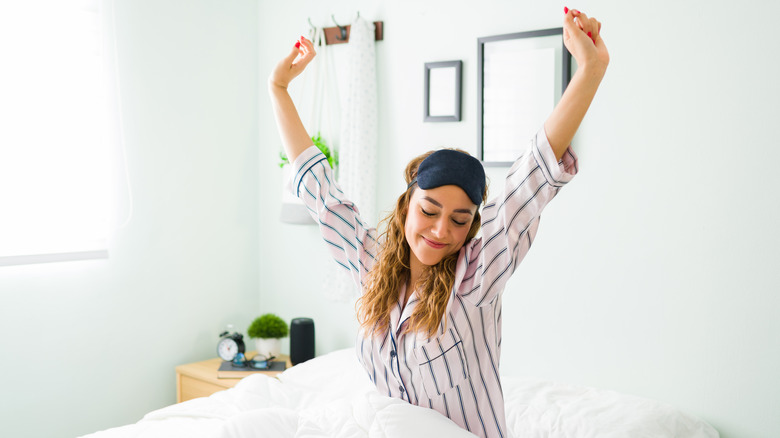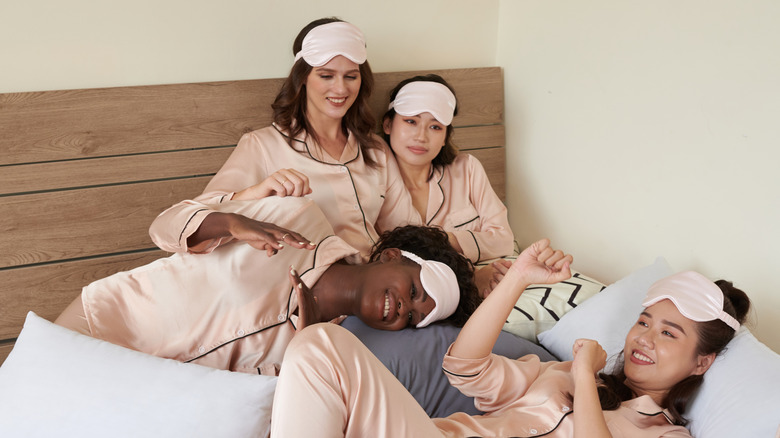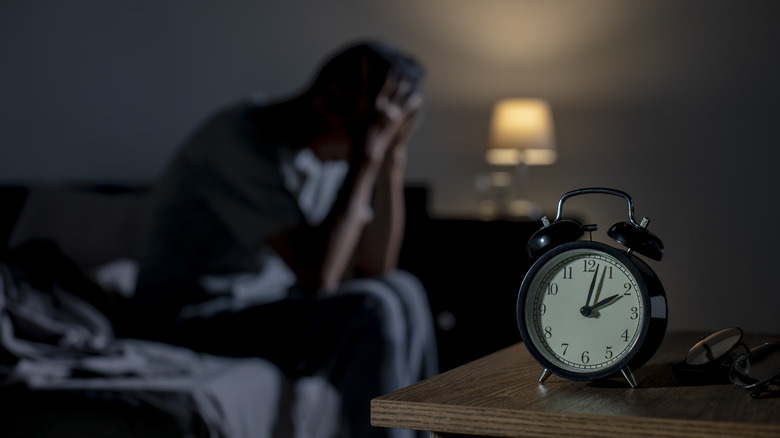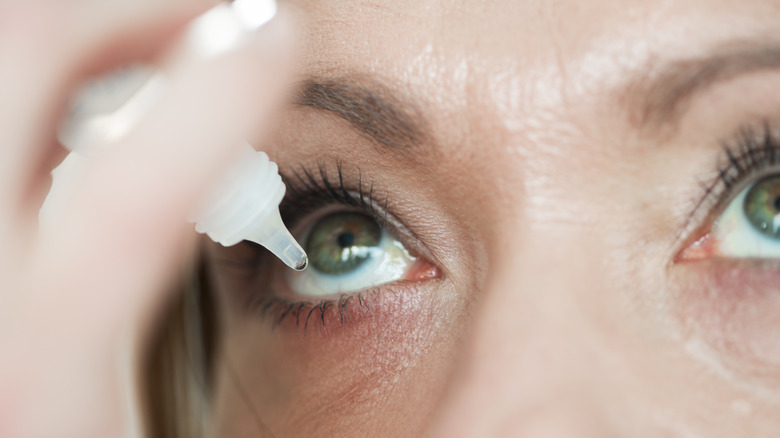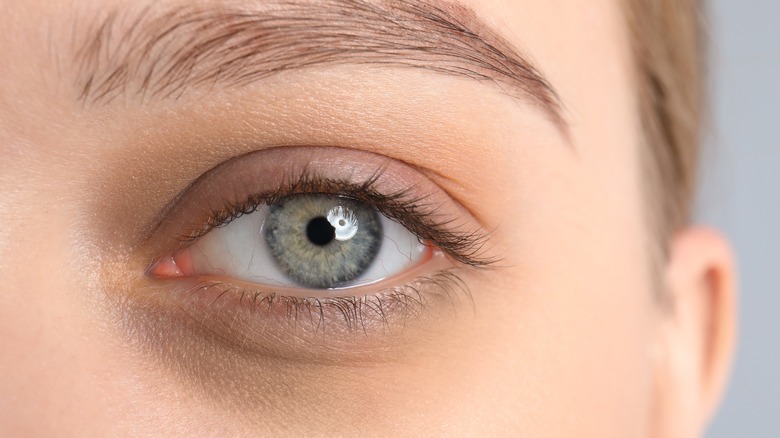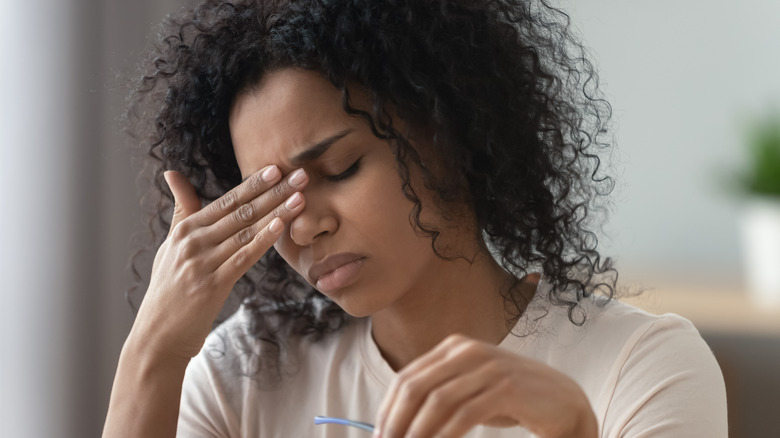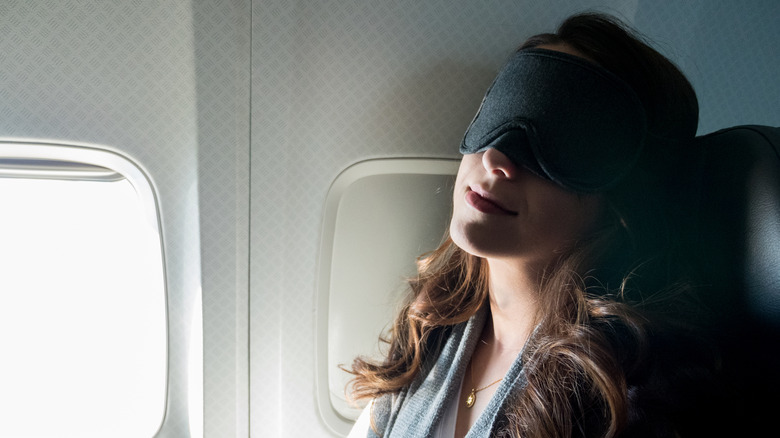What Happens When You Sleep In An Eye Mask Every Night?
From Holly Golightly in "Breakfast at Tiffany's" to Blair Waldorf in "Gossip Girl," eye masks have become somewhat of a pop culture staple to indicate some personality traits — this character is cool, or high maintenance, or just really stressed. But how many of us have looked at an eye mask and thought, "This seems a bit much"?
If you have ever thought that wearing an eye mask was a little excessive or unnecessary — we used to, too — you may be surprised to learn that it can actually provide practical benefits.
"Wearing a sleep mask is potentially a very useful thing to do to improve sleep," Thomas Preston, a clinical assistant professor at Stony Brook Medicine in New York, told Everyday Health. While he said you shouldn't expect "gigantic effects," there are many reasons why including an eye mask in your nightly routine could benefit you.
It enables melatonin to do its job
Falling asleep is important, but it is equally crucial to stay asleep. Hours of sleep improve not only your overall health but also your productivity levels during the day.
By using an eye mask to block out light while sleeping, you are signaling to your brain that it is time to start producing melatonin. "Melatonin's job is to signal to the brain that it is time to get sleepy, so light exposure, particularly at night, sends the wrong signal to the brain, which can profoundly disrupt one's ability to fall asleep quickly and stay asleep," Wendy Troxel, senior behavioral scientist at the RAND Corporation, told Healthline.
Therefore, by wearing an eye mask, you can get more sleep, which will lead to a better and more refreshed version of yourself the next day. It is important to note that sleep is not just about the hours you spend in bed but also the environment and habits you cultivate around your sleep routine, including this one. As Samuel Gurevich, a physician who specializes in sleep disorders, told the Cleveland Clinic, "Putting on an eye cover for sleep can be part of a calming bedtime routine that conditions your brain to recognize everything's safe, calm, and comfortable. Your routine tells the brain it's time to shut off and let sleep come."
It keeps you in REM sleep for longer
In addition to helping you both fall asleep faster and stay asleep longer, wearing an eye mask can also improve the quality of your sleep by increasing the amount of time you spend in REM sleep. REM sleep is an important stage of sleep associated with rapid eye movements and vivid dreaming. It is during this phase that our brains are actively processing the information received during the day, consolidating memories, and restoring energy.
By wearing a mask to help block out light, you are creating a more conducive environment for REM sleep, sleep science coach David Rubin told Byrdie. Since an eye mask can reduce the likelihood of being awakened by light, especially if you are sensitive to it or sleep in a bright environment, your brain will have ample time to fully recharge and reap the benefits of REM sleep.
It may improve next-day 'learning and alertness'
Wearing an eye mask every night is not only a simple and effective way to improve your sleep environment and greatly benefit the quality of your rest, but it can also have a positive impact on your overall health and well-being.
According to a study conducted on the cognitive benefits of wearing an eye mask published in Sleep, making this easy change to your bedtime routine could have a positive impact on your brain. "Our results demonstrate that wearing an eye mask during overnight sleep can facilitate both new learning and alertness the next day," the researchers concluded. This is due, at least in part, to the sleep mask's ability to block out sleep-disrupting light.
The study's lead author, Viviana Greco, told Everyday Health, "Better learning could improve academic and professional performance, while faster reaction times could help in sports, driving, or other situations where quick responses are critical."
It can prevent wrinkles
One of the surprising benefits of using an eye mask is that it may help prevent the formation of wrinkles. Sleep imprints overnight can lead to wrinkles due to your face being pressed against the pillow for long periods. Wrinkles and fine lines, especially around the sensitive skin surrounding your eyes, can develop. However, an eye mask creates a protective barrier.
"Nighttime masks do a good job of keeping skin in place while you sleep, so even if there is a lot of pressure, the skin does not fold on itself," dermatologist Rachel Nazarian told Byrdie.
To protect your skin even more, splurge on a silk sleep mask, as it is gentler on the skin. Silk has other perks, too. "As a fabric, silk is not very absorbent, due to its low porosity, so it can contribute to better moisture retention and ultimately a more refreshed appearance," cosmetic dermatologist Michele Green told Cosmopolitan.
It can help you fight insomnia
Although anyone can wear a sleep mask, they are often recommended for those who experience difficulty sleeping due to insomnia. Insomnia is often caused by both external and internal stimuli that keep the brain active and unable to relax, and wearing an eye mask can help reduce the amount of external factors affecting your ability to fall asleep. This is particularly important for individuals who experience light sensitivity.
When a sleep mask is used in conjunction with earplugs, you may get even more restorative sleep, as a study published in Critical Care showed. Earplugs help block out external noise, which is another common factor of insomnia. By reducing the amount of noise that the brain is exposed to, individuals can rest in a more calming and peaceful sleep environment.
It should be noted, however, that insomnia can be caused by myriad reasons, and eye masks should be considered an aid, not a treatment.
It can help with dry eyes
If you have dry eyes, you know how annoying they can be. One major cause of dry eyes is a condition called meibomian gland dysfunction (MGD), which occurs when these glands either do not produce enough oil or the oil doesn't get released in tears.
Heat can help stimulate oil production and, as such, applying a heated eye mask can be a great at-home treatment for dry eyes. According to Case Reports in Ophthalmology, 10 to 15 minutes of daily use is beneficial as supplemental therapy for MGD. You can opt for microwaveable eye masks or self-heating ones.
However, it's important to note that the skin around your eyelids is delicate. Always test a microwaveable mask against your arm or other body part for a temperature check first and, when in doubt, discuss this approach with a physician. There are even sleep masks made specifically for retaining moisture and treating dry eye throughout the night.
It can reduce swelling
Eye swelling can be caused by many different things such as crying, sleep (due to the lack of eyelid movement), eye strain, dehydration, allergies, aging, and even your diet (too much salt means your body is retaining water). While that puffy appearance is rarely a cause for concern, but rather a cosmetic issue caused by fluid buildup around the eyes, there is no reason why you shouldn't want to combat it in an effort to look your best!
This is where a cooling sleep mask may be useful. Not only are they easy to apply and effective against swelling, but they are also reusable. And because they rely on the vasoconstrictive properties of cold to help relieve the appearance of puffy eyes instead of active ingredients, they are safe for all skin types.
When searching for a good cooling mask, ideally, it should be a weighted mask (for the added benefit of compression therapy). It should be cool for 20 minutes or less (as too much cold for a long time can cause nerve and tissue damage). And you'll want to make sure it fits well and prevents light from reaching your eyes. If you don't see any improvement or notice vision changes, see your doctor to rule out any underlying health conditions.
It can improve symptoms of migraines and sinusitis
Deep pressure stimulation causes your body to relax by stimulating your parasympathetic nervous system. In turn, this lowers your heart rate to help you feel calmer. Studies also suggest that acupressure can help with tension headache relief.
What this means, according to Dr. Michael Breus, is that weighted masks work to "apply light pressure to your face, which can be helpful for tension around the eyes, as well as nighttime headaches or migraines." It also targets the sinus points on the face, specifically between and behind your eyes, above them on your lower forehead, and under them in your cheekbones.
Aside from pressure relief, getting a weighted mask with cooling and/or heating properties can help with these conditions as well. Sara Crystal, a neurologist at New York Headache Center, told InStyle cold compresses can be beneficial for migraine relief. In contrast, hot compresses can help relax your muscles.
It's useful against jet lag
Flying long distances can affect many parts of your body. For example, jet lag disorder is a common sleep problem caused by quick travel across multiple time zones, especially internationally. It is caused by your body's circadian rhythm still being synced to your original time zone. The more time zones crossed, the more likely you are to experience its effects.
This is especially true when flying east, and it usually takes about a day to recover for each time zone crossed. While there are many ways to help lessen the symptoms of jet lag, there really isn't any treatment since this is a temporary problem.
That being said, eye masks can be helpful when traveling as a way to help your body adjust to a new circadian rhythm before you arrive at your destination. Light therapy sleep masks exist, and seem very promising, but if you're unwilling to spend hundreds of dollars on something like this, even a regular sleep mask can assist you in falling asleep during the plane ride.
